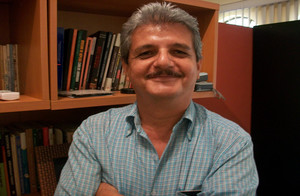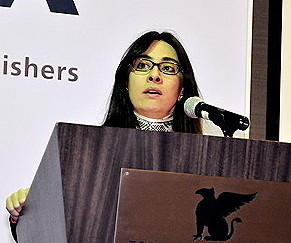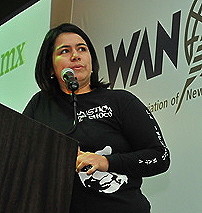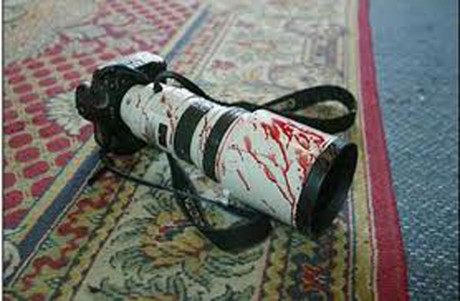Mexican independent weekly newspaper Río Doce was founded in 2003 by a group of five journalists who jointly quit their jobs at a larger regional daily, Noroeste, seeking a more independent editorial line. With a 6,500 weekly circulation, Río Doce is a rare success story of independent journalism in one of the world’s most dangerous regions for media professionals. Río Doce is based in Culiacán, capital of the north western state of Sinaloa. The name Río Doce, meaning ‘River Twelve’, stems from the 11 rivers of Sinaloa state; the newspaper claims to be the 12th, the “river of information and freedom”. Four of the co-founders remain, forming part of a team of around 15 journalists and employees.
Río Doce’s first issue appeared on 3 February 2003. With a very limited initial budget, the five founders struggled during the early years to keep their paper afloat. They started by distributing for free its initial 8,000 - 10,000 print run before gradually introducing a system of charging their readers. Today, 42% of their income comes from weekly circulation. During the first two years, the newspaper suffered from advertising boycotts instigated by the then governor, who pressured businesses by threatening or denying them support and financing from the state government if they advertised with Río Doce. 2004 was a turning point for the newspaper. The weekly uncovered a corruption scandal involving the local police chief, who had acquired numerous estates in a very short period of time. The report revealed proof of all allegations and major regional newspapers published the story. Sales exploded and Río Doce began to forge an image of being a tenacious and serious independent local newsmagazine.
Government harassment through boycotts wasn’t the only obstacle. Culiacán is known throughout Mexico as the cradle of the drug lords. The state of Sinaloa saw the rise of the country’s very first “capos” as early as the 1970s, and the power of the “narcos” (the drug traffickers), is deeply rooted in the culture of the region. Narco-related violence is far from being a recent issue in Sinaloa, like it is in other parts of Mexico. In Sinaloa, the narcos control or influence every aspect of daily life, and violence is rife. Reporting the news in such conditions is no easy task.
Despite the risks, Río Doce’s managers quickly realised that articles covering issues related to the narcos immediately meant an increase in sales. Since the narcos are everywhere in Culiacán and Sinaloa, the question was how to benefit in terms of sales whilst ensuring ethical and critical coverage. Furthermore, the newspaper challenged itself to go beyond the often superficial and morbid coverage of drug-related violence to give readers critical reporting of the issues while at the same time minimising risks for journalists.
Journalism in Sinaloa has always been a high-risk activity. In a recent interview, Javier Váldez, a veteran journalist and one of the weekly’s co-founders, said: “We work under constant threat and constant fear… We only publish 60% of what we know… We’re conscious to remain journalists, not become martyrs. We inform as much as possible and go as far as we can. We avoid crossing the line; the problem is that the lines are often so thin that sometimes they’re invisible.”
Río Doce has become a reference both nationally and internationally for anyone who reports on or studies the effects of drug trafficking. Award-winning New Yorker, Newsweek and Washington Post journalist, Alma Guillermoprieto, referred to the newspaper as “an exception to the general indifference. Having for years made it its business to know a great deal about drug issues, it is a mandatory stop for Mexican and foreign journalists trying to figure out the Culiacán drug scene”.
WAN-IFRA: How would you define the newspaper and its editorial line?
Ismael Bojorquez Perea: We started as an independent newspaper, keeping a healthy distance from all political spheres, with a clear social commitment to bringing our readers information that allowed them to better understand reality. From the beginning, we focused on investigating political and administrative corruption, violence, and social issues. We intended to develop a new spirit in journalism, with reporters that staunchly believe that it is possible to carry out ethical, diverse, professional, critical, purposeful and independent work.
WAN-IFRA: What distinguishes Río Doce from other regional newspapers?
IBP: I think being a weekly newspaper gives us the opportunity to delve into the topics we work on, despite having scarce resources. Our structure does not go beyond five reporters and three or four freelancers. I believe newspapers seriously lack in-depth analysis of the “war on drugs”; they cover the events very superficially and focus on counting the casualties. There is no consistent work on the phenomenon of drug trafficking, which is very unfortunate at a time when the issue requires more attention than ever from the media. On the contrary, I see most of us as having withdrawn, as threats from drug traffickers are higher than ever. Despite all of this, at Río Doce we try to maintain a deeper level of coverage.
WAN-IFRA: What would you identify as the newspaper’s historic moments?
IBP: Our first step was to survive economic hardship because we emerged under an arrogant government that did not accept criticism and tried to starve us to death through advertising boycotts. Basically, our mantra in the first two years was to avoid bankruptcy. The watershed moment was when we revealed a corruption scandal implicating a feared Sinaloa police chief; the story catapulted us to widespread public attention. Another important time was when we hosted an international forum on drugs that was attended by renowned national and international scholars, where we discussed drug trafficking, national security, drug legalisation, and more. The day after the forum came to an end, war broke out within the Sinaloa drug cartel, and violence exploded across the country.
WAN-IFRA: What would you identify as the most difficult moments for your newspaper?
IBP: The aftermath of the break out of war within the Sinaloa cartel was very tough on us and created major difficulties in terms of exercising journalism, as risks loomed over us like never before. From then onwards, we stopped doing traditional journalism and started doing what we call ‘survival journalism’.
WAN-IFRA: How do you interpret the “war on drugs” in Mexico?
IBP: For us, there is no “war” as such, but we do work in the crossfire on a daily basis. If President Felipe Calderon had really declared a “war on drugs”, he would have already dismantled all of its financial circuits and closed down the companies set-up by dealers’ families with the money from trafficking. But he didn’t dare do it because this would have meant increasing unemployment and provoking a decline in GDP. Neither did he attack the so-called “narco-politicians”, those political figures that have close links to drug-traffickers. It is widely known that criminal organisations can’t survive and grow without connections to power.
WAN-IFRA: How do you interpret the situation faced by the Mexican press today?
IBP: The Mexican press is experiencing one of its worst moments, because now that drug trafficking and violence are central themes of the country, the media are in retreat. Self-censorship is rife, to such an extent that many media outlets only repeat information from official press releases. This is terrible for journalism, and it does not comply with the basic mission of giving truthful information to the public. What is needed now is a great debate on the issue, in which the media have much to contribute. Instead they have opted for silence.
WAN-IFRA: What measures, if any, does Río Doce take to protect its employees? How do you cover sensitive stories?
IBP: We are very conscious of the risks we run by covering drug trafficking, even more so since we live and work in Culiacán, one of the most violent cities in the country. We carefully choose the issues, investigate carefully, write and read again and again each article before publication. We censor ourselves, I must admit; there are several articles that never left the office because they were too risky for us. But that’s how it is; the lines are so thin, sometimes you cannot see them clearly.
WAN-IFRA: Sinaloa is nationally and internationally known for being the land of the drugs lords. Is this a myth or a reality? Is the current violence new to Sinaloa?
IBP: Sinaloa is the cradle of the drug business in Mexico, no doubt about it. The most prominent drugs lords have always been from this region: this tradition is like a curse! And the violence here is no myth. We have the second highest homicide rate after Chihuahua, and if things continue we will soon be leading the statistics. So far this year, 1500 murders have been committed in Sinaloa… the same number of victims during the 30-year long internal wars of the Camorra or 'Ndrangheta.
WAN-IFRA: How does violence affect your newspaper as a business?
IBP: It is hard to recognize it, but sadly, violence sells. An upsurge in violence means an increase in sales. But this violence is like a sleeping cobra; you never know when it will bite.










